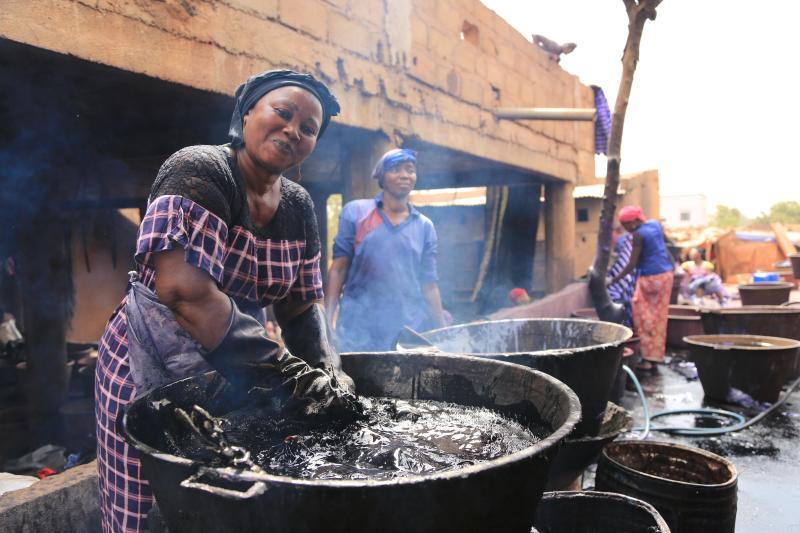Microenterprises (firms that employ fewer than 10 people) and microentrepreneurs are the engines of economic development.
More than 1.7 billion adults around the world do not have a bank account and cannot get a loan, making it hard to start or grow a business, with negative impact for the economy. Microfinance supports them in launching, developing or maintaining a revenue generating activity.
The EIB Group pays specific attention to people who are facing difficulties entering or re-entering the labour market, are threatened by social exclusion, or are otherwise in a disadvantaged position in the conventional credit market.
Here's how it works
The EIB Group has a long-lasting record in microfinance through the activities of the EIB, EIB Global, the European Investment Fund (EIF) and the EIB Institute.
We help the most vulnerable by providing loans and other support to microfinance institutions and investment vehicles. In turn, these institutions grant guarantees, loans and give advice to micro-businesses and micro-entrepreneurs, with a focus on activities that provide, among others, an income to women, young people and those living in rural and poorer communities.
We are committed to microfinance operations that demonstrate enhanced social and environmental policies, impact and added value. We support such operations with tailored financial and non-financial instruments, using EIB’s own resources or under the European Union’s mandates. In addition, the EIB supports the European Commission in the implementation and dissemination of the European Code of Good Conduct for Microcredit Provision, the quality benchmark for ethical and responsible lending practices in the European microfinance sector.
Products and services
The EIB can either directly invest in financial institutions, such as microfinance institutions (MFIs) and banks, or indirectly in microfinance investment vehicles (MIVs), such as funds and microfinance holding groups.
We offer:
- Medium/long-term loans to financial institutions (typically MFIs).
- Equity and debt investments in MIVs that in turn provide debt and/or equity to MFIs.
- Guarantee products for financial intermediaries
The EIB provides technical assistance to enhance the development impact of its microfinance operations. Under the Social Investments and Skills Window of the InvestEU Advisory Hub, we offer tailored support to microfinance and social entrepreneurship finance providers, such as:
- trainings
- peer-to-peer learning and study visits
- institutional assessments and ratings
- impact assessments
- evaluation of the implementation of the European Code of Good Conduct for Microcredit Provision
We also aim to strengthen the capacity of our partner financial institutions to serve microenterprises. We provide technical assistance support and capacity building in an array of areas:
- financial and social performance, to strengthen financial institution sustainability and actively implement client protection principles
- responsible digitalisation of operations, to improve financial partners' outreach to microenterprises, notably in rural areas
- human resource management and governance, to ensure the smooth functioning of the financial institution and the creation of a safe, competitive and responsive environment for its employees
- risk management, for financial institutions' long-term sustainability through identification, assessment, mitigation and monitoring of risk across their operations
- training and coaching programmes for microenterprises, to enhance their financial literacy and entrepreneurial skills
Technical assistance activities are primarily provided through a range of regional customised capacity building programmes.
Check our training series on Sustainable entrepreneurship, originally created for MicroPitch Caribbean in collaboration with Frankfurt School of Finance & Management.
Microfinance across the globe
The EIB is active in microfinance in a number of regions, the most important being:

African, Caribbean and Pacific countries
The Africa, Caribbean and Pacific region (including OCT) accounts for the lion’s share of the EIB’s microfinance portfolio, with the largest country exposure in the Dominican Republic, Kenya and Uganda. Our commitments in debt, equity and technical assistance grants in the region continue to expand.
Highlighted stories
Neighbouring countries
Neighbouring countries include both the Southern neighbourhood (Middle Eastern and North African countries) and the Eastern neighbourhood.
The EIB has been active in the Middle East and North Africa region since 2002, through the Facility for Euro-Mediterranean Investment and Partnership (FEMIP) and FEMIP Trust Fund. The Risk Capital Facility has succeeded FEMIP for Southern neighbourhood countries.
The EIB is also active in the Eastern neighbourhood and has already launched operations under the DCFTA Initiative East.

Highlighted stories

Europe and Accession countries
The EU and its candidate and potential candidate countries represent a big share of the EIB’s microfinance portfolio. Our operations in Europe are often larger compared to our activity in the other regions. The EIB typically conducts such operations via microfinance investment funds, in partnership with the EIF.
In addition, the EIF provides funding and portfolio guarantees to a variety of financial institutions. These financial institutions offer in turn microfinance services in the form of loans, leases and other debt products, guarantees and business development services to the microfinance clients.
Highlighted stories
Why we believe in microfinance
EIB microfinance investments help the most underserved parts of society by focusing on people excluded from the economy and banking. In particular, we help to:
- sustain jobs
- empower women and girls
- build resilient economies
- support rural communities


EIB Global
For more than 50 years, the EIB has been the European Union’s international development bank. Our key investments across the world help create stability, promote sustainable growth and fight climate change everywhere.